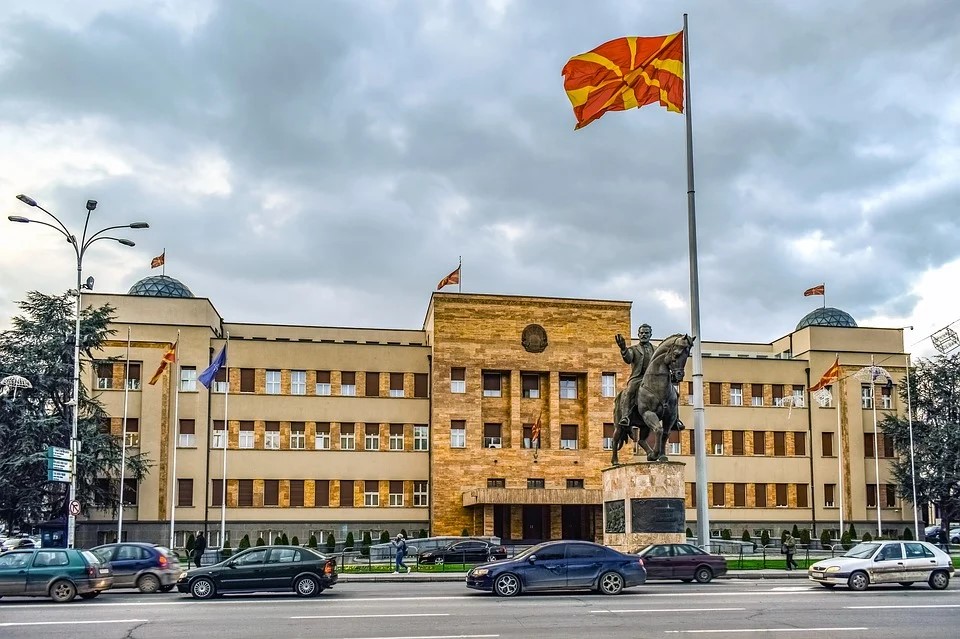European Commission President von der Leyen urged on Thursday North Macedonia to accept a French proposal which could enable the start of accession negotiations which until now have been blocked by Bulgaria.
In a speech to the Macedonian parliament, she was referring to a revised French proposal for a solution of the dispute between North-Macedonia and Bulgaria over issues of historical narratives and language. France presented it at the very end of its EU presidency last June.
If they would agree, intergovernmental conferences on the start of accession negotiations with North Macedonia and Albania could convene without further delay. Bulgaria’s veto against North Macedonia has also prevented the start of negotiations with Albania although candidate countries are supposed to advance in the accession process in their own pace, based on their own merits.
The Commission President almost apologized for the delay in the start of negotiations. North Macedonia has been a candidate country since 2005, even before Bulgaria became a member state in 2007. Already in 2009, the Commission recommended accession negotiations to be opened. For years the negotiations were blocked by Greece until the name issue was resolved in the Prespa Agreement in 2018.
An apparently simple but emotional issue was at last solved by direct contacts between the two countries and the help of a mediator appointed by the UN. Today, Greece and North Macedonia enjoy close and friendly relations.
“The Prespa Agreement was a profile in courage; two countries that agreed to move forward and write the next chapters of their histories together,” von der Leyen said. “I am here today because I believe that this is the moment for you to move ahead towards our common future.”
She said that she was as frustrated as Macedonia that negotiations had not started yet. “But you never gave up. And we, together, never gave up. Together, we followed our dream of one EU. And together, we will turn this dream into reality.”
This can be done as soon as next week, she said. In fact, the first phase of an Intergovernmental Conference is reportedly going to take place in Brussels on Tuesday (19 July).
In her speech, von der Leyen referred to the revised French proposal or protocol and assumed that all are aware of it. “It protects your interests and addresses the concerns of all sides,” she assured.
Asked about the text of the proposal, the spokespersons of the Commission referred The Brussels Times to the website of North Macedonia, where the government claims that it has published the proposal. Three documents in Macedonian and English relating to the opening of an intergovernmental conference and the Commission’s position can be found on the website.
In fact, there is a fourth document, the so-called protocol, to which the other documents are referring but which has not been published, Western Balkans experts told The Brussels Times. The opposition in North Macedonia has called on the government to publish it.
“Should you decide to endorse the revised French proposal, a political Intergovernmental Conference will be held within the next few days,” von der Leyen said. “We, the Commission, will then start immediately the process of screening the acquis. This is the first step in the negotiation process. We will then be glad to welcome your negotiating team to Brussels.”
She encouraged Macedonia to seize the opportunity. “By opening this door now, North Macedonia empowers itself by being in the negotiation process rather than outside of it. And benefits will accrue as you progress. Investments, improved trade links, closer collaboration in key sectors such as energy and transport. New good jobs, business opportunities.”
On the issue of the Macedonian language, she underlined that there can be no doubt that the “Macedonian language is your language”. “And we fully respect that.” At the Commission’s press conference on Friday, the spokesperson declined to clarify if the statement implies an official recognition of the Macedonian language.
At least the language issue should not block translations according to the draft Council conclusions published on the website. “Regarding the translations of the acquis (EU law) into Macedonian, the EU took note of Bulgaria and North Macedonia’s respective unilateral declarations on the Macedonian language.”
On the issue of minority rights, von der Leyen called on North Macedonia, as a successful multi-ethnic society which mirrors the EU's motto: ‘United in diversity’, to amend the constitution to include the small Bulgarian minority as one of the recognized minorities in the country. This has been one of Bulgaria’s conditions to drop its veto.
She assured that bilateral issues, such as the interpretation of history, are not conditions in the accession negotiations. But without an amendment of North Macedonia’s constitution, the opening of the Intergovernmental Conference will not be followed by a second Conference when the real negotiations will start. And an amendment of the constitution requires two thirds majority.
In the draft Council conclusions, the Council welcomes “the intention of North Macedonia to launch and achieve as a matter of priority the relevant constitutional changes, with a view to including in the Constitution citizens who live within the borders of the state and who are part of other people, such as Bulgarians.”
The bilateral issues between North Macedonia and Bulgaria were supposed to have been solved in the framework of the Treaty of Friendship, Good Neighbourliness and Cooperation which was signed between the two countries in 2017. Leaving them to be resolved during the accession negotiations adds an obstacle in a process which is difficult enough and can be suspended or reversed.
A lesson learned from previous enlargements is that North Macedonia must accept the results of any other accession negotiations as they stand at the moment of its accession. “Clear commitments will be needed to ensure that no future Member State is in a position to unduly block the accession of other Western Balkan candidates, provided they meet the Union’s accession criteria.”
M. Apelblat
The Brussels Times

